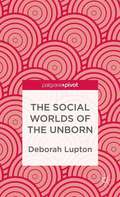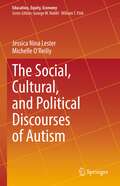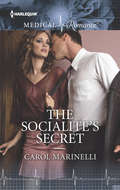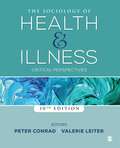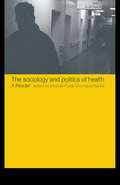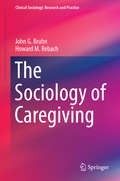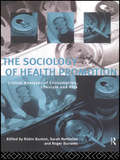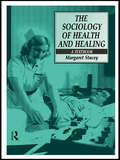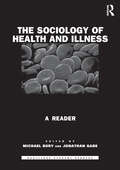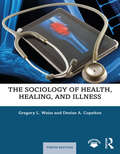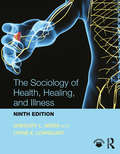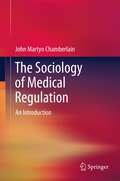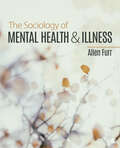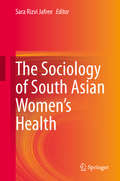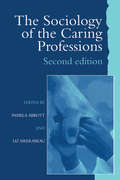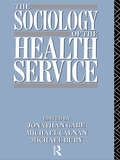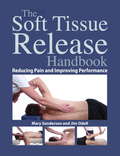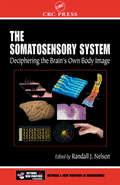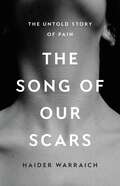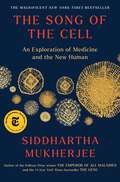- Table View
- List View
The Social Worlds of the Unborn
by Deborah LuptonHuman embryos and foetuses are highly public and contested figures. Their visual images appear across a wide range of forums. They have become commercial commodities as part of the IVF industry and are the focus of intense debates regarding concepts of personhood. This book discusses these issues, drawing on social and cultural theory and research.
The Social, Cultural, and Political Discourses of Autism (Education, Equity, Economy #9)
by Michelle O'Reilly Jessica Nina LesterTaking up a social constructionist position, this book illustrates the social and cultural construction of autism as made visible in everyday, educational, institutional and historical discourses, alongside a careful consideration of the bodily and material realities of embodied differences. The authors highlight the economic consequences of a disabling culture, and explore how autism fits within broader arguments related to normality, abnormality and stigma. To do this, they provide a theoretically and historically grounded discussion of autism—one designed to layer and complicate the discussions that surround autism and disability in schools, health clinics, and society writ large. In addition, they locate this discussion across two contexts – the US and the UK – and draw upon empirical examples to illustrate the key points. Located at the intersection of critical disability studies and discourse studies, the book offers a critical reframing of autism and childhood mental health disorders more generally.
The Socialite's Secret
by Carol MarinelliThe doctor she can't forget Two years ago, socialite Scarlet Portland spent one wild night with ER doc Luke Edwards. She hasn't forgotten their sizzling heat-it's branded on her mind forever-nor that night's devastating emotional repercussions... Now Scarlet's back in London and back in Luke's life. All she wants is one more chance-to see if the happiness she's only ever felt in his arms was real. But though their chemistry burns hot as ever, will he want her when he discovers the truth?
The Sociology Of Health And Illness: Critical Perspectives
by Peter F. Conrad Valerie R. LeiterThe Tenth Edition of The Sociology of Health and Illness: Critical Perspectives addresses the crucial issues in this field with over 45 readings (1/3 of which are new to this edition) from the scholarly literature on health and medicine, thus providing students with the most balanced and comprehensive analysis of health care today. This best-selling anthology from Peter Conrad and Valerie Leiter includes both micro-level and structural perspectives, frameworks for understanding these critical issues, and a breadth of material that allows instructors to mix and match materials to meet their course needs.
The Sociology Of Health, Illness, And Health Care: A Critical Approach
by Rose WeitzCompletely up to date and featuring a friendly style, THE SOCIOLOGY OF HEALTH, ILLNESS, AND HEALTH CARE: A CRITICAL APPROACH, 7th Edition delivers a comprehensive, cutting-edge overview that will challenge you to think creatively and analytically about health and health care. You'll gain an understanding of how social forces affect who gets ill, how we think about illness, how we get our health care, and what it is like to work in the health care field. You will also have the chance to explore the ethical dilemmas that underlie modern health care as well as the politics behind those dilemmas. Although the text focuses on health within the United States, it also examines how health, illness, and health care differ around the world.
The Sociology and Politics of Health: A Reader
by David Banks Michael PurdyHealth care systems, the role of health professionals and the experience of health and illness are all undergoing change and development as we enter the twenty-first century. The Sociology and Politics of Health is a collection of key readings through which to explore the sociological and political dimensions of health, illness and health care. Combining classic pieces with more up-to-date contributions, it includes examples taken from current domestic and international initiatives and draws on humanist, materialist, feminist and constructionalist perspectives. The Sociology and Politics of Health covers: * ideology and policy * social stratification * professionalisation * the experience of health and illness. * This reader offers health studies students, nurses and other health professionals an invaluable introduction to an increasingly important field of social inquiry.
The Sociology of Caregiving
by John G. Bruhn Howard M. RebachThis volume conceptualizes caregiving as an emerging sociological issue involving complex and fluctuating roles. The authors contend that caregiving must be considered in the context of the life span with needs that vary according to age, developmental levels, mental health needs and physical health demands of both caregivers and care recipients. As the nature and functions of caregiving evolve it has become a critical and salient issue in the lives of individuals in all demographic, socioeconomic and ethnic categories. This volume frames caregiving as a sociological issue and addresses a number of central concerns, such as: - Caregiving is a life span experience associated with aging and the roles of spouses and adult children. - Caregiving involves a complex of social system variables that influence the social support and services to caregivers and care recipients. - The nature of the relationship among family caregivers, professional caregivers and the care recipient are embedded in their interaction and dynamics influenced by the internal and external variables that inhibit or facilitate the care situation. - How can caregiving be integrated with a public health agenda? - What disparities or inequalities exist in caregiving and what are the barriers that sustain them? - What community-based interventions need to be developed to improve caregiving?
The Sociology of Health Promotion: Critical Analyses of Consumption, Lifestyle and Risk
by Sarah Nettleton Robin Bunton Roger BurrowsPromotion of health has become a central feature of health policy at local, national and international levels, forming part of global health initiatives such as those endorsed by the World Health Organisation. The issues examined in The Sociology of Health Promotion include sociology of risk, the body, consumption, processes of surveillance and normalisation and considerations relating to race and gender in the implementation of health programmes. It will be invaluable reading for students, health promoters, public health doctors and academics.
The Sociology of Health and Healing: A Textbook
by Margaret Stacey Professor Margaret Stacey"...It is well-written and well-referenced...this is an important, innovative, enjoyable textbook which can be highly recommended for use in undergraduate and postgraduate sociology courses on health related subjects, and which will be of value in courses on women's studies and gender. It will also be of interest to inquiring health care practitioners of whatever persuasion." - Sociology "This book takes a bold step in pointing new directions for sociological and social-historical studies of health and health care." - Social History of Medicine Throughout the book, the division of labour in health care, especially as it relates to social class and gender divisions, is taken as central. Its particular characteristic, and one that distinguishes it from other texts in this field, is that feminist critiques of health care are considered alongside the mainstream writing in the social history of medicine, and in medical sociology. Part I takes an historical approach to the types of healing knowledge, the modes of treatment, and the organization of health care found in Europe over the last four hundred years. Part II is a sociological analysis of contemporary health care covering concepts of health and illness, the organization of the National Health Service, the division of labour, the impact of international capitalism, and the issues at stake in arguments about human reproduction.
The Sociology of Health and Illness: A Reader (Routledge Student Readers)
by Michael Bury Jonathan GabeA wide-ranging collection of both classic writings and more recent articles in the sociology of health and illness, this reader is organized into the following sections: * health beliefs and knowledge* inequalities and patterning of health and illness* professional and patient interaction* chronic illness and disability* evaluation and politics in health care. With a thorough introduction which sets the scene for the field as a whole, and section introductions which contextualize each chapter, the reader includes a number of different perspectives on health and illness, is international in scope, and will provide an invaluable resource to students across a wide range of courses in sociology and the social sciences.
The Sociology of Health, Healing, and Illness
by Gregory L. Weiss Denise CopeltonWith thorough coverage of inequality in health care access and practice, this leading textbook has been widely acclaimed by teachers as the most accessible of any available. It introduces and integrates recent research in medical sociology, and emphasizes the importance of race, class, gender, and sexuality throughout. This new edition leads students through the complexities of the evolving Affordable Care Act. It significantly expands coverage of medical technology, end-of-life issues, and alternative and complementary health care—topics that students typically debate in the classroom. Many new text boxes and enhancements in pedagogy grace this new edition, which is essential in the fast-changing area of health care. New to this edition: More text boxes relating the social aspects of medicine to students’ lives. Expanded coverage leading students through the complex impacts of the ACA and health care reform. Greater emphasis on sexual minority health and LGBTQ+ persons’ experiences in the health care system. Expanded coverage of medical technology, end-of-life issues, and alternative and complementary health care. ‘Health and the Internet’ sections are updated and renovated to create more interactive student assignments. New end-of-chapter lists of terms, with key terms as flash cards on the companion website. An updated instructor’s guide, with test bank.
The Sociology of Health, Healing, and Illness
by Gregory L. Weiss Denise CopeltonWith thorough coverage of inequality in health care access and practice, this leading textbook is widely acclaimed by instructors as the most comprehensive of any available. Written in an engaging and accessible style, with multiple student-friendly features, it integrates recent research in medical sociology and public health to introduce students to a wide range of issues affecting health, healing, and health care today. This new edition links information on COVID-19 into each chapter, providing students with a solid understanding of the social history of medicine; social epidemiology; social stress; health and illness behavior; the profession of medicine; nurses and allied health workers; complementary and alternative medicine; the physician-patient relationship; medical ethics; and the financing and organization of medical care. Important changes and enhancements in the eleventh edition include: Inclusion of material on COVID-19 in the main text of every chapter, with special sections at the end of each chapter exploring additional intersections of COVID-19 with chapter content. Expanded coverage of fundamental cause theory and the social determinants of health. New centralized discussions of how and why social disparities in race, class, gender, and sexual identity impact health outcomes in the United States. New “In the Field” boxed inserts on topics such as medical education and student debt, physicians’ use of medical jargon, and corporate greed. New “In Comparative Focus” boxed inserts on topics such as the 1918 influenza pandemic, infant and maternal mortality in Afghanistan, the patient care coordination process, drug prices, long-term care, and global health. A more in-depth look at both physician and nursing shortages. Expanded discussion of nurse burnout during the COVID-19 pandemic. Curricular and pedagogical changes in medical schools. Discussion of continued changes in the financing of the US health care system. A more in-depth look at quality concerns in nursing homes. Increased attention to the health care systems in Norway, Germany, Cuba, and Mexico. An updated instructor’s guide with test bank and PowerPoint slides.
The Sociology of Health, Healing, and Illness
by Gregory Weiss Denise CopeltonWith thorough coverage of inequality in health care access and practice across the field it surveys, The Sociology of Health, Healing, and Illness is widely acclaimed by instructors as the most comprehensive of any available. Written in an engaging and accessible style, with multiple student-friendly features, it integrates and contextualizes recent research in medical sociology and public health to introduce students to a wide range of issues affecting health, healing, and health care today.This new edition links information on COVID-19 into each chapter, providing students with timely and familiar examples to deepen their understanding of the many social dimensions of health care, such as the social history of medicine, social epidemiology, social stress, health and illness behavior, the medical profession, nurses and allied health workers, complementary and alternative medicine, the physician-patient relationship, medical ethics, and the financing and organization of medical care.Important changes and enhancements to this eleventh edition include: A heightened focus on social disparities in race, class, gender, and sexual identity, addressing how these differences impact health outcomes in the United States and why Updates to the boxed sections that explore topics “In the Field” and “In Comparative Focus,” sparking readers’ curiosity and drawing their attention to topics such as medical education and student debt, as well as the continuities and differences in health care and public health issues across time and space Thorough examination of newer perspectives and developments in the field, including the issue of nurse and physician burnout during the COVID-19 pandemic, quality concerns in nursing homes, and the inner workings of health care systems in other parts of the world Improved support materials for instructors, featuring updated exam questions and lecture slides that correspond to the book’s newer content Altogether, the new edition of The Sociology of Health, Healing, and Illness maintains the foundational coverage of the field that the book is well known for and enriches its presentation with considered attention to contemporary patterns, perspectives, and research – perfect for introducing readers to the important and tremendously meaningful issues studied by medical sociologists.
The Sociology of Health, Healing, and Illness
by Lynne E. Lonnquist Gregory L. WeissWith thorough coverage of inequality in health care access and practice, this leading textbook has been widely acclaimed by teachers as the most accessible of any available. It introduces and integrates recent research in medical sociology and emphasizes the importance of race, class, gender throughout. This new edition leads students through the complexities of the evolving Affordable Care Act. It significantly expands coverage of medical technology, end-of-life issues, and alternative and complementary health care—topics students typically debate in the classroom. ?Many new textboxes and enhancements in pedagogy grace this new edition, which is essential in the fast-changing area of health care. New to this Edition *More textboxes relating the social aspects of medicine to students' lives *Expanded coverage leading students through the complex impacts of the ACA and health care reform? *Expanded coverage of medical technology, end-of-life issues, and alternative and complementary health care? *'Health and the Internet' sections updated and renovated toward student assignments? *New, end of chapter lists of terms *Updated test bank
The Sociology of Medical Regulation
by John Martyn ChamberlainThis book provides a comprehensive examination of the complex issues surrounding the regulation of the medical profession. It offers up-to-date information on the current legislative framework and institutional arrangements surrounding the regulation in the United Kingdom. Well organized and written in an accessible way, it offers an insight into key sociological theories surrounding medical regulation. It gives a historically situated analysis of the contemporary relationship between medicine, the state and the public, and an overview of relevant social scientific research. Case studies highlight the practical or applied circumstances in which issues can occur. Readers will gain insight into possible future directions for medical governance.
The Sociology of Mental Health and Illness
by Allen FurrThe Sociology of Mental Health and Illness explains sociology’s key contributions to our understanding of mental health, and serves as a strong counterpoint to the medical approach to the subject. Using both micro and macro-level theories, particularly social constructionism, the text shows the subjective nature of mental illness and systems of diagnosis and treatment. It also emphasizes how social conditions and relationships create life pathways toward mental health and psychological struggles, and uses the concept of "patient career" to describe how individuals interact with mental health professionals. In addition, the text explores the connections between mental health and social problems such as terrorism, substance abuse, criminal violence, suicide, and domestic violence.
The Sociology of Mental Health and Illness
by Allen FurrThe Sociology of Mental Health and Illness explains sociology’s key contributions to our understanding of mental health, and serves as a strong counterpoint to the medical approach to the subject. Using both micro and macro-level theories, particularly social constructionism, the text shows the subjective nature of mental illness and systems of diagnosis and treatment. It also emphasizes how social conditions and relationships create life pathways toward mental health and psychological struggles, and uses the concept of "patient career" to describe how individuals interact with mental health professionals. In addition, the text explores the connections between mental health and social problems such as terrorism, substance abuse, criminal violence, suicide, and domestic violence.
The Sociology of South Asian Women’s Health
by Sara Rizvi JafreeThis contributed volume is the first-known collection of essays that brings together scholarly review, critiques, and primary and secondary data to assess how sociocultural factors influence health behavior in South Asian women. The essays are authored by working scholars or healthcare practitioners from Bangladesh, India, and Pakistan. In the chapters, the contributors acknowledge social, economic, and environmental factors to recommend improved interventions and health policy for women of the region.Studies on South Asian women’s health have targeted clinical evidence, with less attention on social and environmental factors driving health recovery and health outcomes. The South Asian region, more than any other part of the world, is driven by traditional and cultural forces that are possibly the most significant factors determining a woman’s health awareness and her rights to adopt healthy behavior or pursue health recovery. Women of the region share a common culture and political history, and there are benefits to understanding their problems collectively in order to design joint improvements in health policy for women.Salient, but neglected, socio-political areas that influence health behavior and health outcomes in women of the region are covered in the chapters including:Oral Narrations of Social Rejection Suffered by South Asian Women with Irreversible Health Conditions Women’s Role in Decision-Making for Health Care in South Asia Poverty, Health Coverage, and Credit Opportunities for South Asian WomenRefugee, Displaced, and Climate-Affected Women of South Asia and Their Health ChallengesThe Political Sociology of South Asian Women’s HealthThe Sociology of South Asian Women’s Health is a useful resource for students, researchers, and academicians, especially those interested in public health, gender, social policy, and occupational management, as well as healthcare practitioners, administrators, health and public policy-makers, government officers, and scholars of South Asian studies.
The Sociology of the Caring Professions
by Pamela Abbott; Liz MeerabeauThis text provides students with a comprehensive introduction to the sociology of professions. It covers social work, probation, nursing, midwifery and health visiting and looks at key topics such as control and legal relationships, the relationship of gender and care, and the 'new managerialism'.
The Sociology of the Health Service
by Michael Bury Jonathan Gabe Michael CalnanThe Sociology of the Health Service responds directly to the need to develop a sociological analysis of current health policy. Topics covered vary from privatisation and health service management to health education and the politics of professional power. Also included is an histroical review of sociology's contributions to health policy and proposals for an agenda for sociological health policy research in the 1990s.
The Soft Tissue Release Handbook
by Mary Sanderson Jim OdellFor practitioners of massage therapy, sports massage, remedial massage, and physical therapy, soft tissue release is a powerful tool in treating chronic pain conditions such as shoulder impingement, tennis elbow, and iliotibial band friction syndrome. Soft tissue release also aids post-surgical recovery and is used in the treatment of highly trained athletes, dancers, and musicians who wish to tackle those small but key tissue areas needed to maintain and improve their performance. The soft tissues consist of muscle fibers, myofascia, tendons, and ligaments. The all-encompassing nature of this connective tissue is becoming increasingly fascinating to bodywork practitioners of all kinds, including massage therapists, physical therapists, chiropractors, osteopaths, orthopedic nurses and doctors, and sports therapists. Treatment of the soft tissues continues to gain momentum, and there are many exciting research developments that demonstrate how manipulation of these tissues can have profound effects on the structure and function of the musculoskeletal system. Skilled release of the soft tissues reduces the need for adjustments or joint mobilizations, because appropriate release improves joint movement. Freeing the joints and enhancing the health of the soft tissues also facilitates a superior and lasting response to rehabilitation programs. The Soft Tissue Release Handbook is aimed at practicing therapists who wish to address the soft tissues precisely and effectively, whether as an adjunct to existing bodywork techniques or as a treatment modality in itself. The skills presented in this book can be immediately applied in the clinic with existing and new clients. Graphic illustrations of the key muscles involved in movement, as well as over 200 full-color photographs of the technique in action, make this an easy-to-use and practical guide.
The Soldier She Could Never Forget
by Tina BeckettSome things you never forget... Your first time. Your first love. Your first broken heart. Or, in Jessi Riley's case, all three combined in one...as Clinton Marks. Bad boy extraordinaire, Clint left town the night of Jessi's graduation, after sharing one unforgettable night together. Now, two decades later, he's back in her life as the military doctor looking after her daughter! As shared memories float to the surface, Jessi and Clint can no longer deny their longing for each other. Could it be that second time around, one night will become forever?
The Somatosensory System: Deciphering the Brain's Own Body Image
by Randall J. NelsonExploring new and past research in the understanding of how the brain deals with its own body image, this book provides a review of pertinent literature and offers comprehensive descriptions of technical approaches. The material includes new frameworks for the conceptualization of the system's representations, scientific and clinical applications that stem from these approaches based on the new concepts, and a discussion of tools used to study the interface of the brain and the body. The book provides computational strategies for sensorimotor integration of the mammalian brain and includes algorithms for the design and implementation of haptic interfaces and tactile displacement.
The Song of Our Scars: The Untold Story of Pain
by Haider WarraichA doctor&’s personal and unsparing account of how modern medicine&’s failure to understand pain has made care less effectiveIn The Song of Our Scars, physician Haider Warraich offers a bold reexamination of the nature of pain, not as a simple physical sensation, but as a cultural experience.Warraich, himself a sufferer of chronic pain, considers the ways our notions of pain have been shaped not just by science but by politics and power, by whose suffering mattered and whose didn&’t. He weaves a provocative history from the Renaissance, when pain transformed into a medical issue, through the racial legacy of pain tolerance, to the opiate epidemics of both the nineteenth and twenty-first centuries, to the cutting edge of present-day pain science. The conclusion is clear: only by reckoning with both pain&’s complicated history and its biology can today&’s doctors adequately treat their patients&’ suffering.Trenchant and deeply felt, The Song of Our Scars is an indictment of a broken system and a plea for a more holistic understanding of the human body.
The Song of the Cell: An Exploration of Medicine and the New Human
by Siddhartha MukherjeeWinner of the 2023 PROSE Award for Excellence in Biological and Life Sciences and the 2023 Chautauqua Prize! Named a New York Times Notable Book and a Best Book of the Year by The Economist, Oprah Daily, BookPage, Book Riot, the New York Public Library, and more! In The Song of the Cell, the extraordinary author of the Pulitzer Prize–winning The Emperor of All Maladies and the #1 New York Times bestseller The Gene &“blends cutting-edge research, impeccable scholarship, intrepid reporting, and gorgeous prose into an encyclopedic study that reads like a literary page-turner&” (Oprah Daily).Mukherjee begins this magnificent story in the late 1600s, when a distinguished English polymath, Robert Hooke, and an eccentric Dutch cloth-merchant, Antonie van Leeuwenhoek looked down their handmade microscopes. What they saw introduced a radical concept that swept through biology and medicine, touching virtually every aspect of the two sciences, and altering both forever. It was the fact that complex living organisms are assemblages of tiny, self-contained, self-regulating units. Our organs, our physiology, our selves—hearts, blood, brains—are built from these compartments. Hooke christened them &“cells.&” The discovery of cells—and the reframing of the human body as a cellular ecosystem—announced the birth of a new kind of medicine based on the therapeutic manipulations of cells. A hip fracture, a cardiac arrest, Alzheimer&’s dementia, AIDS, pneumonia, lung cancer, kidney failure, arthritis, COVID pneumonia—all could be reconceived as the results of cells, or systems of cells, functioning abnormally. And all could be perceived as loci of cellular therapies. Filled with writing so vivid, lucid, and suspenseful that complex science becomes thrilling, The Song of the Cell tells the story of how scientists discovered cells, began to understand them, and are now using that knowledge to create new humans. Told in six parts, and laced with Mukherjee&’s own experience as a researcher, a doctor, and a prolific reader, The Song of the Cell is both panoramic and intimate—a masterpiece on what it means to be human. &“In an account both lyrical and capacious, Mukherjee takes us through an evolution of human understanding: from the seventeenth-century discovery that humans are made up of cells to our cutting-edge technologies for manipulating and deploying cells for therapeutic purposes&” (The New Yorker).
